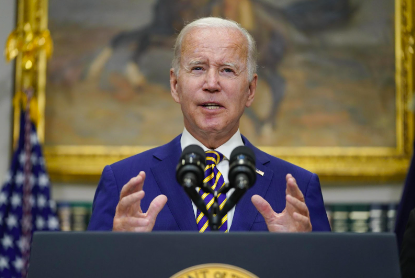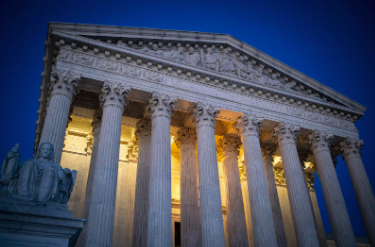Nayan Shankaran ‘24 | Elle du Pont ‘25 | Sophia Hu ‘24
A federal appeals court has blocked U.S. President Joe Biden’s student loan forgiveness plan indefinitely. The plan was intended to cancel up to $20,000 of debt for students and families, who are struggling from the effects of the pandemic. Despite this move, for citizens who have not yet applied for student loan forgiveness, “the application on studentaid.gov remains open… the temporary order does not prevent borrowers from applying for relief,” according to NPR.

Photo courtesy of forbes.com
Per whitehouse.gov, the official website of the White House, the plan outlined three steps that proposed how the student loan debt could be canceled. The first step of the plan was to provide temporary relief to people making less than a certain earnings cutoff, pausing required debt payments until after December 31, 2022. The earnings cutoff is set at $125,000 of annual income for individuals and $250,000 for families. For the second step of the plan, the Biden administration, along with the Department of Education, aimed to cut monthly payments for some undergraduate loans in half to alleviate the stress for these borrowers. Biden also hoped to refine the Public Service Loan Forgiveness Program (PSLF) by extending credit to individuals with career history at a nonprofit, the military, or the local, state, or federal government. In an effort to protect future students and taxpayers, the third step of the plan proposed the lowering of college costs and the potential removal of community college costs altogether.
The plan received pushback from several Republican-led states (Arkansas, Missouri, Nebraska, Iowa, Kansas, and South Carolina), which filed a lawsuit against Biden for misusing the 2003 Heroes Law to cancel the student debt. The Heroes Law gives the education secretary the ability to waive regulations around student loans during times of national emergency, which the U.S. continues to face due to COVID-19. The states claim that the Heroes Law was created for much smaller situations, such as relaxing regulations for those in the military with student loans, according to the New York Times. NPR adds that these states claimed that “the federal relief program would hurt state-based loan companies that manage some federal loans themselves.”
Opposing the lawsuit, AP U.S. Government and Politics teacher David Mercante argues that Biden’s use of the law was an appropriate way to cancel student debt. He states, “That’s the same law that former President Trump used to suspend student loan payment earlier during his presidency at the beginning of COVID. [Biden’s] argument is the law allows you to suspend or alter student loan payments during national emergencies; COVID is a national emergency, and canceling the debt is the same as altering the terms of the loan.”
Some members of the EA community believe that the plan has positive intentions. Austin Bouvel ‘24 considers that the plan would have been beneficial to the U.S. overall, and that it could have allowed for more students to go to college. He says, “I think that college is pretty expensive, so more aid is good.”
Some seniors, who might have been impacted by student loan policies in college, also feel that the plan could have been beneficial in helping them cancel potential debt. Gaeli Keffer-Scharpf ‘23 argues, “I know this in particular would help a lot of people. And, I understand there’s views on the other side like ‘this is costing taxpayers a lot of money,’ which everything does. But overall, I am in support of it.”
Emma Lunn ‘23 concurs, stating, “It’s a good initiative to take because it will allow students with a lesser income to still pursue different educational opportunities and have a broader field of options in front of them.”
However, other members of the EA community do not support the Biden administration’s efforts toward the plan, arguing that the plan did not address the crux of the debt dilemma. Registrar and Administrative Coordinator of the College Counseling Office Danielle Avicolli explains, “It doesn’t address the real problem, which is not loan repayment but ‘Why are we borrowing so much money to attend college? Why is it that Americans can’t afford higher education?’”
Elaborating on Avicolli’s statement, Chair of the History Department and AP Economics teacher Steven Schuh states, “Although [the plan] was a good start, it did not address the systemic problem that college is too expensive in general, and loans for colleges are too easily available. And, therefore, some educational institutions are taking advantage of their students.” Andrea Yu, Upper School Librarian, has concerns about the plan’s efficacy as well, describing the plan as “a band aid solution to a lot of much larger issues that our society has to deal with.”
Schuh also believes that Biden should have addressed the third step of the plan differently. The third step involves reducing college tuition, holding colleges accountable for increasing their tuition, and making community colleges free. Schuh says, “The problem with this perspective is that increasing college tuition is not the core of the problem. Usually when college tuition increases, the quality still remains the same. This could mean that while college tuition increases, the amount of students receiving financial aid remains constant.”
Schuh also thinks that lowering the threshold of citizens who are qualified to take out a loan would have improved the plan as well because “particularly some at the top of the threshold may be in position to do very well without needing for someone to repay their loans.”
In addition to faculty, some students have opposed the plan as well. Adding onto Schuh’s criticisms, Aaron Tang ‘24, a student currently taking AP Economics, states, “I understand it is meant for good intent and will give America a lot of benefits, but at the same time, I think it also might be a little unfair to the people who worked hard for a lot of years to pay off their own student debt. I believe a lot of self-made, successful people who couldn’t afford college or worked hard to pay off all of their debt would find it unfair that they are now paying for others’ debt.”
Critics also argue that the Biden administration overstepped its use of executive power, and that the plan was enacted entirely on its own without input from Congress. Mercante says, “[I wonder] about how the policy was enacted. Even if the Heroes Act allows the President to forgive this student loan debt, which I think it probably does legally, I’m not sure whether it’s something the President should do in terms of how representative government is supposed to work in America.”
Additionally, members of the EA community who possess student loan debt and tried to apply for the benefits of the plan observed that limited accessibility and poor execution could have led to its ban. Rebecca Rosenthal, Middle School and Upper School Classics teacher, reflects, “[The debt cancellation was] poorly organized, similar to the Covid relief payouts. My partner was on the phone for like three hours trying to get it.”
Mercante believes that the legal process surrounding the plan will progress at a slow pace, and he is unsure of whether the plan will eventually be implemented. He explains, “What has happened with the courts is just the beginning of a very long process of challenging the President’s plan in the courts. This is a normal part of the process of checks and balances — the downside of this process is that it’s slow moving and complicated and could delay the implementation of a policy that eventually is found to be legal. The upside of this process is that it helps to prevent abuses of power and could block the implementation of a policy that breaks the law. We’ll have to wait to find out which is which in this case.”

Photo courtesy of cnn.com